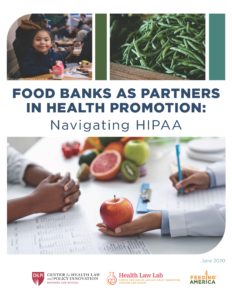Originally posted on Health Law Lab on July 1, 2020
The Center for Health Law and Policy Innovation of Harvard Law School (CHLPI), together with Feeding America, the nation’s largest network of food banks, has released Food Banks as Partners in Health Promotion: Navigating HIPAA,* a resource for food banks working together with health care entities while navigating federal patient privacy law.
Across the country, health care providers and payers are increasingly focused on the social determinants of health—conditions in the places where people live, work, and learn that affect their overall health but are not traditionally addressed in a doctor’s office. This trend has led to a growing number of effective collaborations between health care entities and social service organizations, including food banks working to address an important social determinant: access to food.
Food plays a key role in shaping health and wellbeing. Nutrition affects the onset, management, and outcome of many health conditions, including but not limited to: diabetes, kidney disease, heart disease, stroke, certain cancers, obesity, and HIV. Recognition of the impact of food on health outcomes shines a spotlight on food banks as frontline organizations addressing food insecurity and supporting people in meeting nutritional needs. This point is further underscored by the critical role food banks have played during COVID-19.
By working together, food banks and health care entities can complement each other’s expertise with tangible benefits for patients, as proven through a number of studies on nutrition interventions in health care. However, operationalizing these partnerships can pose unique challenges as organizational leaders navigate complex health laws and policies.
Food Banks as Partners in Health Promotion: Navigating HIPAA is an in-depth and practical guide to help food banks (and health care providers and payers) build optimal, integrated systems that are compliant with HIPAA—the key source of federal requirements relating to patient privacy. The resource includes:
- Approaches to structuring a partnership and information-sharing in compliance with HIPAA;
- Tips on using HIPAA-compliant software;
- Sample agreements to support partnerships; and
- An overview of various HIPAA requirements.
As communities re-open following public health and safety efforts to control the coronavirus emergency and strategize around recovery, there is an unprecedented opportunity to envision a more holistic, just, and equitable health care system that addresses social determinants of health. This resource is here to help advance that vision.
*In 2017, CHLPI and Feeding America published Food Banks as Partners in Health Promotion: How HIPAA and Concerns about Protecting Patient Information Affect Your Partnership. This document provides an overview of how HIPAA influences information-sharing between health care providers and food banks, and strategies for effective coordination and communication to keep health information safe. In this update, Feeding America and CHLPI highlight additional approaches to sharing information in compliance with HIPAA and respond to questions received—and lessons learned—from food banks that have put the guide into practice.



Health Law & Policy, Commentary
Braidwood Management v. Becerra: Updated FAQs for Health Advocates and Providers
July 22, 2024